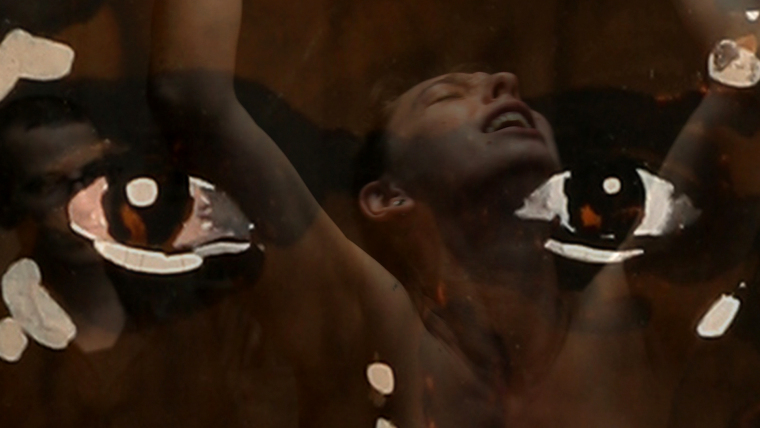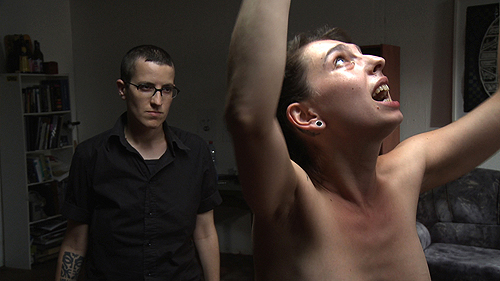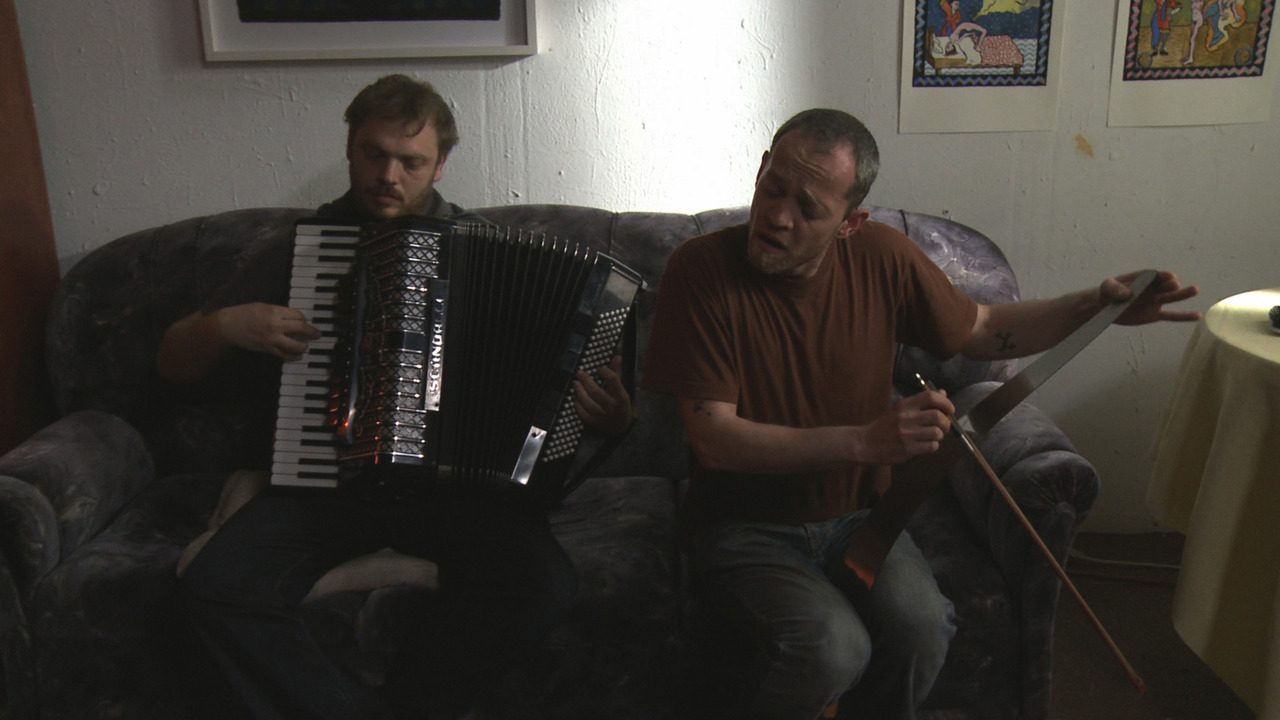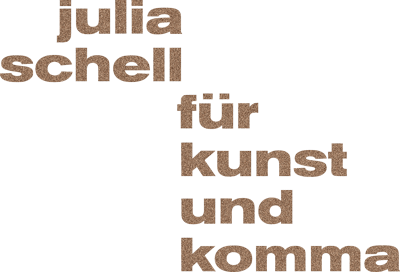Between fetishism and fascism
Roee Rosen’s Tse/Out is a powerful semi-documentary-fantasty portrait of BDSM (Bondage and Discipline, Dominance and Submission, Sadism and Masochism) as a transgression into the subconscious. In interviews and role play two Israeli women reflect on power, pleasure and how BDSM provides a framework to explore cultural politics.
 Ela, a 25-year who has been raised in an extremely racist and right wing home embodies the sub (submissive partner). And Yoana, 32, feminist and queer activist as well as left-wing activist against the Israeli occupation embodies the dom (dominant partner). Yoana performs an exorcism on Ela to get the demon of Avigdor Liebermann (right-wing Israeli politician and foreign minister, living in one of Israels illegal settlements) out of her body. Ela and Yoana characterise Avigdor Liebermann as a collective demon of society who seeks order, not justice. Yoana says that Liebermann is just one incarnation but that the demon belongs to all of Israel. And Ela admits that Liebermann’s political views are part of her right-wing identity and she resists having Liebermann being expelled from her.
Ela, a 25-year who has been raised in an extremely racist and right wing home embodies the sub (submissive partner). And Yoana, 32, feminist and queer activist as well as left-wing activist against the Israeli occupation embodies the dom (dominant partner). Yoana performs an exorcism on Ela to get the demon of Avigdor Liebermann (right-wing Israeli politician and foreign minister, living in one of Israels illegal settlements) out of her body. Ela and Yoana characterise Avigdor Liebermann as a collective demon of society who seeks order, not justice. Yoana says that Liebermann is just one incarnation but that the demon belongs to all of Israel. And Ela admits that Liebermann’s political views are part of her right-wing identity and she resists having Liebermann being expelled from her.
 Video still from Tse/Out, 2010.
Video still from Tse/Out, 2010.
BDSM is about consensual sexual behaviour and – maybe even more than other forms of sex – has to be based on trust, empowerment and intimacy. Whilst for Yoana, „great liberty and pleasure“ comes from giving up control in a safe and secure place, Ela adds that there is also a „desire to flirt with the extreme point of pain beyond which you cannot take it“. It is not simply about the endorphins causing a feeling of being high but also about utmost trust of the sub into the dom so that the latter can lead the former to places not reachable otherwise.
Throughout the exorcism, Ela talks in Liebermann’s tongue spilling out all original quotes from Liebermann: zionist and racist political statements as well as the demon’s resistance to leave her body. Torah-quotes evoking the tolerance of Judaism mix with historical interpretations about Europe’s politics on Hitler and finally very personal quotes such as: „No one loves me, no one appreciates me“. The movie ends with an old romantic folk song „Letter to Mother“ by Sergei Yesenin – mourning a lost home and sorrowless childhood.
 Video Still from Tse/Out, 2010.
Video Still from Tse/Out, 2010.
In his film, Rosen invites us to see the sexual practice of BDSM as a transgressive social praxis: a means of getting in touch with our subconscious self that is disciplined and suppressed in society every day. Society is built on oppression and power, Yoana explains, which are „building blocks to fantasies“ since they enforce our super-ego to control ourselves. In BDSM these super-egos can be used to build something out of choice. They point out that no relationships and no sex exist withouth power relations and that BDSM is a framework that just lays them open, so that we are empowered to deal with them.
Adrian Rifkin calls Rosen’s work an „aesthetic resistance instead of moral confrontation“. According to him, Rosen wants to take us to a stage where we are neither fascinated, nor demonized but beyond the moralistic cage. Rosen portrays Israel as a society that since the Holocaust is reduced to thinking in moral categories of good and bad. And one strategy to resist that super-ego is engaging with it through sex and BDSM, both of which do not operate in those moral categories.
 Artist Roee Rosen. CC.
Artist Roee Rosen. CC.
Rosen explores history through merging arts & politics. In doing so, pornography becomes a tool to shed light on the psychology of trauma which, according to Rosen, is part of the collective identity of Israelis. He points to parallels between pornography and the fetishistic way of memorizing the Holocaust. It seems as though the superimposed Jewish identity of victimhood can only be reversed through role play. This is where Rosen locates the political dimension of pornography.
___________________
OUT/TSE is part of Vile, Evil Veil, the first Uk solo show of Roee Rosen.
The exhibition is on at Rivington Place until 5 May 2012.
Blasphemy and Redemption – a series of talks, screenings and discussions on themes from the work of Roee Rosen.
Curated and chaired by Adrian Rifkin.
Back to POSTS!
